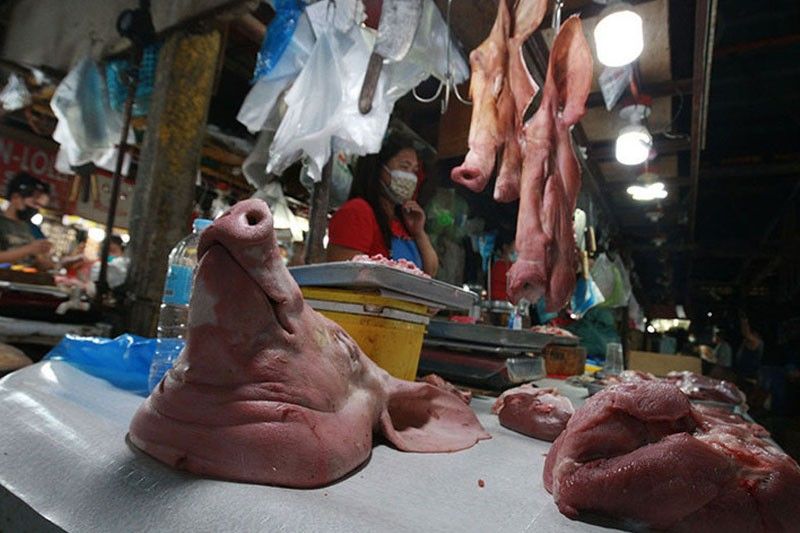Agriculture groups ask Duterte to stop MAV hike

MANILA, Philippines — Various agriculture associations have banded together to appeal to President Duterte to reject the Department of Agriculture‘s (DA) plan to increase the minimum access volume (MAV) and reduce tariffs on pork, saying such measures will negatively impact the industry.
“Neither of these proposals are necessary, nor are they beneficial to consumers and the local hog industry, Mr. President. Increasing the MAV to 400 million kilos of pork is equivalent to eight million pig heads, and is way above the current inventory of our backyard hog raisers at 6.9 million heads,” agriculture groups said in a letter to President Duterte.
“This action will not make pork more affordable for our countrymen, and it further cripples a hog industry that is already suffering from the DA’s mismanagement of the ASF (African swine fever) outbreak,” they said.
The DA has proposed to increase the MAV for pork to 400,000 MT from 54,000 MT in a bid to augment supply and stabilize rising prices of pork.
President Duterte earlier recommended the proposal to Congress.
As for the reduction of tariff, the DA proposes to lower tariff for in-quota pork imports or those within the MAV to five percent for the first three months and increase this to 10 percent afterwards.
Imports under MAV are currently slapped with a 30 percent tariff.
For those outside the MAV, an initial 15 percent tariff is being proposed before hiking it to 20 percent. At present, out-quota imports are levied at 40 percent. The proposal covers meat of swine, fresh, chilled or frozen.
The group said the DA’s proposals could deal a fatal blow to the hog industry.
“To address pork supply and price concerns, the pork shortfall can be imported at the current tariff level and MAV allocation without any additional burden to importers as the current tariff rates already provide profits of P200 to P250 per kilo for importers. There is no need to incentivize them further; increasing the MAV and lowering tariffs serve to only increase the profits of importers at the expense of Filipino consumers who will not benefit from lower pork prices,” the group said.
Meanwhile, the group stressed that reducing the tariffs on pork imports would also deprive the government of around P12 billion to P14 billion in revenues, which could be used to finance government programs aimed at helping the livestock industry recover faster from the ASF outbreak, as well as for the government’s COVID-19 response.
Instead of expanding the MAV allocation and reducing tariffs, the agriculture groups are urging Duterte to direct the DA to fully implement Republic Act 10611 or the Food Safety Act of 2013, which will mandate the testing of all pork and meat imports at the port of first entry and help contain both the ASF and COVID-19 viruses.
Agriculture groups have long been pushing for strict border control measures, including the establishment of a facility at the country’s port of entries or the Agriculture Commodity Examination Area (ACEA).
The ACEA, with its controlled temperature environment, will capacitate the quarantine officers to thoroughly inspect the contents of an identified high-risk containerized agricultural shipment. Each ACEA will feature a laboratory to enable the immediate testing of samples from commodities suspected to carry animal, fish or plant pests or diseases and other hazardous contents.
In July last year, the DA, through the Bureau of Animal Industry (BAI), said ACEAs would also be put up at Manila South Harbor, Subic Freeport Zone, Port of Batangas, Cebu International Port and Port of Davao.
About P2 billion has been allocated for the establishment of five ACEAs which the DA hopes to complete by the end of the year.
Agriculture groups are also requesting Duterte to place the entire country under a state of calamity to allow the government to allocate adequate funds to properly address the ASF outbreak and help the hog industry.
“We wish to stress that prior to the ASF outbreak, the livestock sector in general and the hog industry in particular were among the main growth drivers of our agriculture sector,”the group said.
The hog industry contributes an estimated P416 billion to the country’s gross domestic product, along with the feeds supplied by rice and corn farmers, coconut growers and sugar workers.
It accounted for 45 percent of the total value of production of the Philippine livestock and poultry subsector in 2019.
The agriculture groups include the Samahang Industriya ng Agrikultura, Agriculture Sector Alliance of the Philippines, ABONO Party List. National Federation of Hog Farmers, Pork Producers Federation of the Philippines, United Broiler Raisers Association, Philippine Maize Federation Inc., Philippine Veterinary Medical Association, Sorosoro Ibaba Development Cooperative, Philippine Egg Board Association, Philippine Veterinary Drug Association and Philippine Association of Feed Millers.
- Latest
- Trending





























